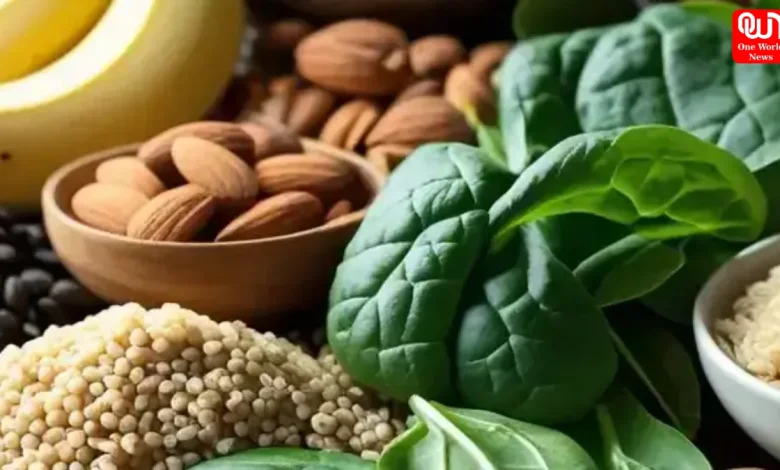
5 Lithium-Rich Foods To Add To Your Diet For Mental Wellness, Stress Reduction, And Better Brain Health
Lithium is a trace mineral known for its powerful effects on mental health, mood stability, and brain function. While it is often associated with medical treatments, small, natural amounts of lithium from food can play a significant role in supporting emotional balance and cognitive performance. Incorporating Lithium-Rich Foods into your diet can help promote calmness, enhance brain clarity, and reduce symptoms of stress and anxiety. Here are five natural lithium sources that can easily be included in your everyday meals.
Why Lithium-Rich Foods Matter
The Role of Lithium in the Body
Lithium plays a vital role in brain chemistry by influencing neurotransmitters that regulate mood, such as serotonin and dopamine. It helps protect neurons from oxidative stress and inflammation, supporting long-term brain health. Even in microdoses, lithium from food can contribute to mental clarity, emotional stability, and better sleep.
Natural vs. Medicinal Lithium
Unlike the high doses used in medical treatments, natural lithium found in foods and water is gentle and safe. Consuming Lithium-Rich Foods helps maintain balanced mental energy and supports overall wellness without side effects.
Read more: Asom Divas 2025: Celebrating Assam’s Rich Heritage and Remembering the Legacy of Sukapha
1. Legumes: Beans and Lentils
A Natural Source of Lithium
Legumes such as beans, lentils, and chickpeas are among the best Lithium-Rich Foods available. They not only provide this essential trace mineral but also deliver plant-based protein, iron, and fiber that support overall health.
How They Benefit Mental Wellness
Regular consumption of beans and lentils can stabilize energy levels, improve gut health, and promote emotional balance. Their lithium content supports neurotransmitter function, helping to reduce anxiety and fatigue.
Easy Ways to Include Them
Add lentils to soups and salads, enjoy chickpea hummus as a snack, or use beans in stews and curries for a balanced, nutrient-dense meal.
2. Whole Grains: Quinoa, Oats, and Brown Rice
Rich in Trace Minerals
Whole grains are excellent natural sources of lithium along with magnesium, zinc, and B vitamins—nutrients vital for brain and nerve function. These Lithium-Rich Foods help maintain emotional resilience and reduce stress.
Why They Support Brain Health
Lithium in whole grains assists in maintaining stable mood and cognitive sharpness, while complex carbohydrates boost serotonin levels, contributing to feelings of calmness and satisfaction.
How to Add Them to Your Diet
Enjoy oatmeal for breakfast, use quinoa as a base for salads, or replace refined rice with brown rice in your meals to get a steady supply of lithium and other essential nutrients.
3. Leafy Greens: Spinach, Kale, and Swiss Chard
Lithium and Plant Nutrition
Leafy greens are packed with essential minerals, antioxidants, and trace amounts of lithium. These vegetables not only detoxify the body but also provide the nutrients needed for neurotransmitter production.
Boosting Mood Naturally
Regular intake of leafy greens helps lower oxidative stress, which is linked to mood disorders. Their lithium content supports neural communication, improving focus and emotional regulation.
Ways to Consume Leafy Greens
Add spinach to smoothies, make kale chips, or toss Swiss chard into your stir-fry. Aim for at least one serving of leafy greens daily to benefit from their lithium and nutrient content.
4. Potatoes: A Surprising Source of Lithium
The Power of Root Vegetables
Potatoes, especially when grown in mineral-rich soil, contain small but significant amounts of lithium. They also provide potassium and vitamin B6, nutrients that play a role in mood regulation.
Supporting Brain Function
The lithium found in potatoes may help protect neurons from damage and maintain a healthy mood balance. Combined with complex carbohydrates, they serve as a comforting, nourishing food that stabilizes blood sugar and supports mental energy.
Best Ways to Eat Them
Opt for baked or boiled potatoes instead of fried ones. Pair them with other Lithium-Rich Foods like beans or leafy greens for a wholesome, mood-enhancing meal.
5. Nuts and Seeds: Walnuts, Almonds, and Flaxseeds
Nutrient-Dense Mood Boosters
Nuts and seeds are powerhouse foods packed with healthy fats, magnesium, and trace minerals, including lithium. They support brain health, enhance concentration, and reduce anxiety.
Why They Work So Well
The combination of omega-3 fatty acids and lithium in nuts and seeds helps maintain optimal brain chemistry and reduces inflammation, leading to better emotional balance.
Simple Ways to Enjoy Them
Add walnuts or almonds to your morning oats, sprinkle flaxseeds on salads, or blend them into smoothies. A handful daily can provide both mental and physical health benefits.
Additional Tips for a Lithium-Rich Diet
Drink Mineral-Rich Water
Natural spring and mineral waters often contain trace amounts of lithium. Staying hydrated with lithium-containing water can enhance your daily intake and support overall well-being.
Focus on Balanced Nutrition
A diet rich in vegetables, grains, legumes, and nuts not only boosts lithium intake but also provides antioxidants and essential nutrients that promote mental clarity and energy.
Read more: World AIDS Day 2025: Spreading Awareness, Fighting Stigma, and Supporting Global HIV Prevention
Conclusion
Incorporating Lithium-Rich Foods into your diet is an easy and natural way to support mood balance, brain health, and overall emotional well-being. From beans and leafy greens to nuts and potatoes, these nutrient-packed foods provide gentle doses of lithium that work harmoniously with your body. A balanced diet, regular hydration, and mindful eating can help enhance your mental resilience and maintain inner calm naturally—making these five Lithium-Rich Foods a smart choice for long-term wellness.
We’re now on WhatsApp. Click to join.
Like this post?
Register at One World News to never miss out on videos, celeb interviews, and best reads.







